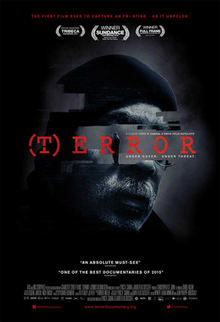(T)error
| (T)ERROR | |
|---|---|
 |
|
| Directed by |
Lyric R. Cabral David Felix Sutcliffe |
| Produced by | Eugene Jarecki |
| Starring | Saeed Torres |
| Music by | Robert Miller |
|
Release date
|
|
|
Running time
|
93 minutes |
| Country | United States |
| Language | English |
(T)ERROR is an American 2015 documentary film directed by Lyric R. Cabral and David Felix Sutcliffe. The film follows undercover FBI informant Saeed "Shariff" Torres as he engages in a sting operation targeting a white Muslim man named Khalifah Ali Al-Akili. The film won the Special Jury Award for Breakout First Feature at the 2015 Sundance Film Festival, where it premiered.
It is the first documentary to follow an active FBI case while in progress. This is the first film for Cabral and the second for Sutcliffe. Sutcliffe said the film's intention was to show informants and their targets, and focus on the "decisions, tactics and objectives of counterterrorism cases."
The film was re-titled FBI Undercover when broadcast in the UK by the BBC as part of their Storyville TV series.
The story was also retold on This American Life.
Co-director Cabral was a student living in Harlem when her downstairs neighbor of four years, Saeed Torres, disappeared in May 2005. Cabral's investigation into his disappearance eventually became the subject of her film. Shortly before Torres' disappearance, Sutcliffe and Cabral met at an afterschool arts program, where one of their students, Adama Bah, a 16-year-old Muslim teenage girl was arrested by the FBI and accused of being a "potential" suicide bomber. Her arrest triggered a growing interest for both Cabral and Sutcliffe in the FBI's counterterrorism tactics, and an increasing awareness of the central role of informants in the majority of domestic terror plots.
The film was received positively by critics. It received a 90% Fresh rating on Rotten Tomatoes based on 30 reviews. It also received a score of 71 (generally favorable) on Metacritic, based on 10 reviews. The consensus according to Rotten Tomatoes being "(T)ERROR should dishearten and disturb viewers concerned with the erosion of American civil rights — and it doesn't even hit its targets as hard as it could.".
...
Wikipedia
